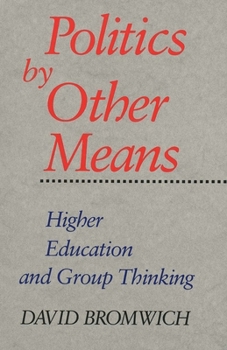Politics by Other Means: Higher Education and Group Thinking
Select Format
Select Condition 
Book Overview
Liberal education has been under siege in recent years. Far-right ideologues in journalism and government have pressed for a uniform curriculum that focuses on the achievements of Western culture. Partisans of the academic left, who hold our culture responsible for the evils of society, have attempted to redress imbalances by fostering multiculturalism in education. In this eloquent and passionate book a distinguished scholar criticizes these positions and calls for a return to the tradition of independent thinking that he contends has been betrayed by both right and left. Under the guise of educational reform, says David Bromwich, these groups are in fact engaging in politics by other means. Bromwich argues that rivals in the debate over education have one thing in common: they believe in the all-importance of culture. Each assumes that culture confers identity, decides the terms of every moral choice, and gives a meaning to life. Both sides therefore see education as a means to indoctrinate students in specific cultural and political dogmas. By contrast, Bromwich contends that genuine education is concerned less with culture than with critical thinking and independence of mind. This view of education is not a middle way among the political demands of the moment, says Bromwich. Its earlier advocates include Mill and Wollstonecraft, and its roots can be traced to such secular moralists as Burke and Hume. Bromwich attacks the anti-democratic and intolerant premises of both right and left--premises that often appear in the conservative guise of preserving the tradition on the one hand, or the radical guise of opening up the tradition on the other. He discusses the new academic fundamentalists and the politically correct speech codes they have devised to enforce a doctrine of intellectual conformity; educational policy as articulated by conservative apologists George Will and William Bennett; the narrow logic of institutional radicalism; the association between personal reflection and social morality; and the discipline of literary study, where the symptoms of cultural conflict have appeared most visibly. Written with the wisdom and conviction of a dedicated teacher, this book is a persuasive plea to recover a true liberal tradition in academia and government--through independent thinking, self-knowledge, and tolerance of other points of view.
Format:Paperback
Language:English
ISBN:0300059205
ISBN13:9780300059205
Release Date:February 1994
Publisher:Yale University Press
Length:276 Pages
Weight:0.75 lbs.
Dimensions:0.9" x 5.4" x 8.2"
Customer Reviews
1 rating
A Very Important Study
Published by Thriftbooks.com User , 15 years ago
This is a thoughtful book that will be of growing historic interest. Bromwich is examining aspects of American higher education from the vantage point of one in-between. Standing in the midst of a `movement' or cultural trend he records his concerns and speculates on that movement's etiology and future. The movement is usually encapsulated now by the word `Theory'--that alteration of more traditional literary study under the influence of political or quasi-political thought, some of it traditional leftist thought, some of it more narrowly Nietzschean thought as mediated by a succession of French writers. The subject of Bromwich's book is broader--higher education and group thinking, but identity politics and multiculturalism have proceeded hand-in-glove with the changes in the study of literature (or the substitution of quasi sociology for more traditional literary study). From the present perspective we would probably say that Bromwich is an educational conservative but not a political conservative. One of his principal subjects here is tradition and its importance. He is a Burkean and asserts the importance of both Burke's vision of tradition and its importance for our professional and political lives. He speaks at length of the current within literary thought that privileges the voices of the `unempowered', to the point that that view depreciates the thought of the empowered, without regard to the content or quality of that thought. In other words, he is examining a pattern that, ultimately, denies (or at least severely limits) freedom of speech and judges importance by the nature of the group issuing the thought rather than studying the thought itself on its own merits. This also, of course, has great implications for notions of individual identity. Judging people principally as members of the group to which they have somehow been assigned is ultimately a form of anti-intellectualism as well as an assault on our notions of the individual. Marxists, of course, have always been interested in seeing individuals as, first and foremost, members of classes and modern activists anxious to protect demographic perks resist the notion of people thinking of themselves as unique persons. Add the academic maneuvers on behalf of (fill in the blank)-Studies departments and the origin of something that appears odd at first glance becomes clarified. Bromwich is particularly strong on our actual historical tradition. He notes that many of the positions taken by contemporary scholars (as of 1992) are based on an opposition to a previous tradition which, essentially, never existed. The forms of professional and individual behavior which constitute the great strawman against which contemporary voices react is just that, a strawman. Bromwich studied within the belly of the putative beast--at Yale, when Yale was not only the top English department in America but also the supposed flash point for a lot of the cultural change that has been alleged.





